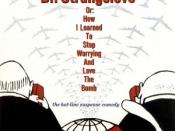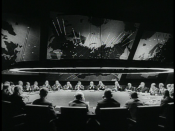Elspeth Wilson Politics & Film Final Paper December 15, 2000 It's the End of the World...and I Feel Fine! (The role of intellectuals in the creation and justification of nuclear weapons.) In Fail Safe and Dr. Strangelove, Or: How I Learned to Stop Worrying and Love the Bomb, Sidney Lumet and Stanley Kubrick question the relationship between technology and humanity by emphasizing mankind's tendency to create machines that cannot be adequately controlled. By blatantly revealing the absurdity of game theory (Mutual Assured Destruction as a reasonable deterrence for nuclear war), both directors call into question the dominant pro-Cold War American ideology. One of the most quintessential aspects of this ideology includes the drive for constant technological advance and strategic superiority. Without the brainpower of the scientists and intellectuals who dedicated their lives to the extension of technological power and the study of international conflict, the Arms Race would certainly not have been possible.
These academics not only became the architects of atomic weapons but they were also faced with justifying the use of these nuclear bombs, and creating a theoretical framework within which nuclear warfare might be appropriately (and rationally) conducted. Within this context, one noteworthy parallel between Fail Safe and Dr. Strangelove is the existence (in both films) of a single intellectual genius that actively perpetuates the "science" of nuclear advancement and strategy. Indeed, through the characterizations of Professor Groeteschele and Dr. Strangelove, both Lumet and Kubrick examine the prominent role of intellectuals (both scientists and theorists) in the creation and justification of nuclear warfare. Ultimately, both Lumet and Kubrick reveal the problems with relying solely on science and mathematics to resolve international conflict, thus suggesting that modern warfare requires a more humanistic, ethical definition of right and wrong. Both Fail Safe and Dr Strangelove serve as moralizing...


